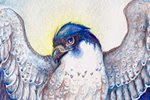This is an acrylic painting on a 5X7 sheet of green matboard. The colors used were:
Titanium White
Mars Black
Burnt Sienna
Raw Umber
Colbalt Blue
Naples Yellow
Cadmium Yellow (just a tiny bit for the eyes)
Blocking in basic values
I did scan the sketch, but since the matboard is so dark, my pencil lines didn't show up in the scan. So this is the earliest scan in the process - basic, grayed values. Here, I add a little raw umber to my gray mixture.
More value, blocking in rough details
I'm still not getting too detailed - here I'm still using a rather large brush to block in rough details, such as the feather patterns. I eventually switch to a round for the thinner feather edges. I'm still only using black, white and raw umber.
Painting details, finalizing value
As I push my values, I start to add subtle colors to the grays, such as a little burnt sienna to where the golden nape feathers are. My values are at about 85% here, since I know when I add my color glazes, I'll lose a little bit of my value and have to go back and touch up my highlights.
Glazes, final painting
From grayed browns, to a full-color eagle! By glazing a little burnt sienna with naples yellow over the nape, I give the golden eagle its 'golden' title. This eagle is inspired by Chrysos, the golden eagle at Horizon Wings, so named because of her scientific name - Aquila chrysaetos - which literally translates to "golden eagle" I use raw umber mixed with a tiny bit of colbalt blue in areas where I want a duller brown, and to push the value away from the bright orange-gold of the neck and back of the head. To make your golds really pop, you need to surround them with duller colors. A completely-golden golden eagle will look a bit boring, just as the surrounding green and white feathers of a ruby-throated hummingbird are what make that vibrant gorget so stunning.










yooNeye love the same thing:
ReplyDeletefantasy. And have I gotta lotta.
Wanna fly to the very stars with I aboard
the stunning, 1,500-foot-tall-Raww!kuss?
Wanna write zzzillions of novels in my Big Ol
Magnificent Mansion throughout d’universe?
WannaXplore bizarre, psycho worlds?
Wanna see the exponential God/
treasures ♾ in the starry sky??
I’ll even be@the Rong Way café in 7th Heaven
doin slap-shtick-comedy: textbook, Noo-Joisey-
axent! cuTNToo, 5-star-entertainment!! Saturate
yore panacea now: start our ‘starry-sky-reality’!!
Follow me to the Wedding Feast:
⚡️psychopathicmath.blogspot.com⚡️
Cya soon, ya gorgeous wildflower...